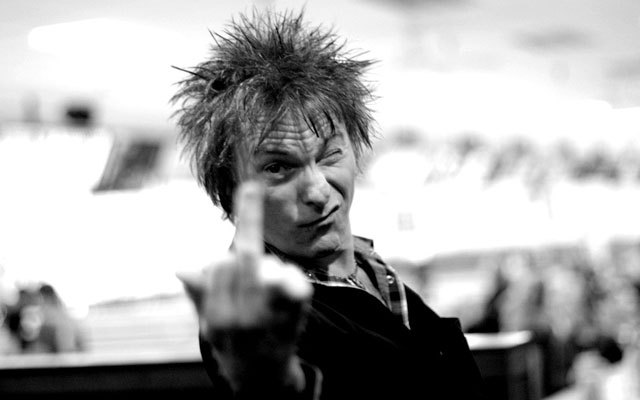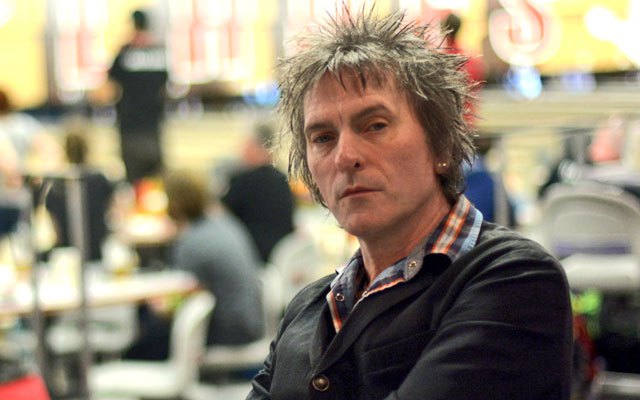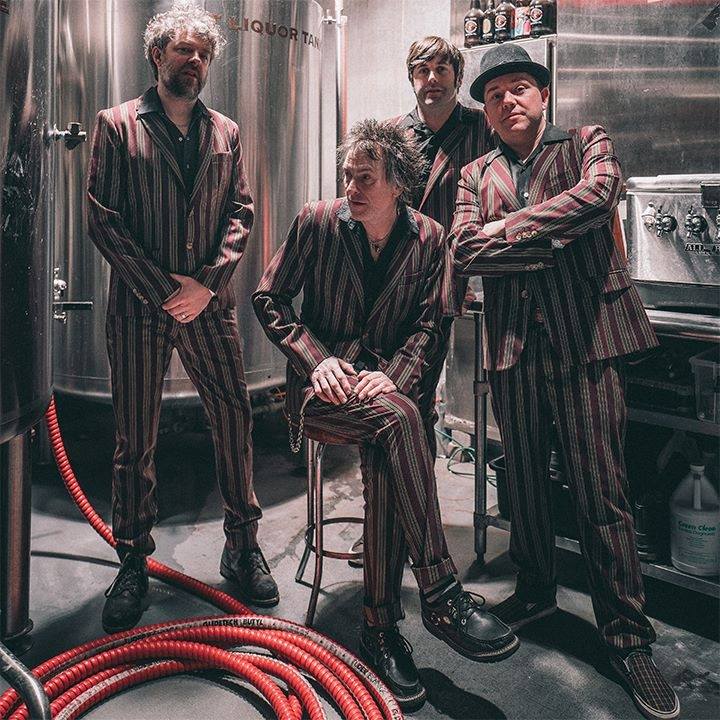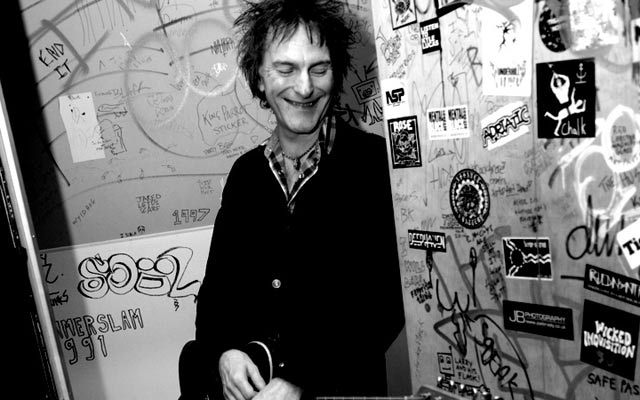The legendary Replacements bassist has reformed his other old band, Bash & Pop, and chats to us about their return

Tommy: “I don’t carry the weight of pressure of having been the songwriter of The Replacements. I get to do what I want.”
As both a founding (and crucial) member of The Replacements and core part of the Guns N’ Roses line-up from 1998 to 2016, underpinning them both with his bass playing, Tommy Stinson’s place in the pantheon of music is all but assured. Not even a teenager when the former started out on their journey, it’s almost impossible to imagine him as anything other than a rock ‘n’ roll star. Along the way he has found time to release two solo albums and contribute to bands such as Soul Asylum, Perfect and Old 97’s.
For his latest project Stinson has taken centre stage, reformed another of his old groups, Bash & Pop (at least in name), and recorded a new album. Originally his post-Replacements outfit, their only other release came out way back in 1993. His bandmates may have all changed, and now include Steve Selvidge of The Hold Steady and Joe Sirois of The Mighty Mighty Bosstones, but the rhythm and blues swagger of the first album remains, making Anything Could Happen a worthy addition to his legacy.
Ahead of the record’s UK release, we caught up with Tommy to discuss the return of Bash & Pop and his life in music…
How did the idea to revitalize Bash & Pop come about?
“It came about because I made a band record, the original Bash & Pop record was meant to be a band record and fell slightly short of that. Friends of mine that I’d played it for were saying the energy reminded them of a Bash & Pop record and so I got thinking. It’s not a solo record, it’s a band record, which is kind of different. So I decided to call it Bash & Pop and it seems to make sense to everyone.”
Did you already have the songs before you got the musicians in?
“As the songs were being written I put the guys around it. The touring band that I have right now plays on about two thirds of the record, save for about three or four songs, and it just seemed to be a good vibe so it stuck. Lucky me, I guess my buddies like playing with me.”
What would you say is the difference between a band record and a solo one?
“Very simply I recorded the songs on this record live. It’s as live it possibly could be; guitar, bass, drums and vocals live in my studio in New York here. I didn’t want to fuss around too much with it. I didn’t want to overthink things and do this, that and the other thing that really had nothing to do with the songs. I wanted to let the songs be the guiding light to what they were going to be.
“The difference between when you’re making a solo record is that you’re kind of piecemealing it together the best you can. You’re wearing a bunch of different hats, you’re playing bass, you’re playing guitar and other things when left to your own devices. I think that my preference at the moment is to not be left to my own devices and let the songs dictate where they’re going to go, with a group.”

Tommy on The Replacements: “It was very instinctual, letting the songs and the music make their own thing.”
Would you then jam it out with the rest of the band?
“That’s exactly it, ‘here’s a song, here’s a melody, here’s a riff, now make it your own.’ Let’s play it and we’ll do it in three takes.”
What do you think those guys brought to the songs?
“They understood that concept, which was the most important part, and they played their balls off and we got it within three to five takes and it was great. With The Replacements in the early 80s we’d go into the studio for maybe three days at a time and just knock out a whole record and we may have worked up the new songs the week before. It was very instinctual, letting the songs and the music make their own thing.”
Why do you think those songs by The Replacements have lasted?
“I think because they’re honest, they’re telling tales of real stuff that we were living, breathing and smelling.”
Did being on The Replacements reunion tour help you get back into that mindset?
“When we went out on tour for the reunion we totally had an idea that we would go and make a record. Sadly we didn’t end up in the right place at the right time to do that, where all those planets would align. I think partly because there was too much baggage to carry and compete with, but it just didn’t work out. We tried three times and failed three times, done deal. Two or three of these songs from the Bash & Pop record might have been on the Replacements record if we’d made one, possibly. But you know, it just didn’t work out, whatever.”
Are there specific things that you’ve gleaned from working with people like Paul Westerberg and Axl Rose that you think you can hear on this record?
“I would be foolish to say that you couldn’t hear a little of either man on it because you’ve got to be honest with yourself about these kind of things. If you’ve been in a band for 10 years, like I was with The Replacements, and grew up in that, and then did my own things like Bash & Pop, Perfect and playing with Puff Daddy, and then you go into Guns N’ Roses, I would be foolish to try and portray that I wouldn’t have some of those influences in everything I do. I think if you spend enough time with someone, whether with a girl or a friend or a band or whatever, you’re going to walk away with influences from those things. They’re going to permeate in some way, you’ve just got to accept that and it’s cool. It’s part of life, it’s part of living and growing and becoming your own thing and also knowing where your roots are.”

Tommy with Bash & Pop: “If you spend enough time with someone…you’re going to walk away with influences from those things.”
Is songwriting something that you’ve become increasingly interested in over the years or has it always been there?
“The only thread that there is with all this stuff is I want it to be honest and I want to have fun with it and I can’t belabour stuff that isn’t worth belabouring. As many years as I’ve done this I can’t really sit around and suffer too much stupidity and fucking around. I like to get down to it and I like to have fun with it and if it ain’t going to be good and fun then it ain’t worth my time.
“Luckily for me I’ve been able to sustain this for so many years and eke out a living. I’ve been lucky, really lucky and I won’t shit you on that. I’m very lucky to still do what I love doing and can still pay some of the bills.”
You started doing this when you were ridiculously young. From the outside it feels like this is the only thing that you ever could do…
“Pretty much, that or telemarketing!”
Do you remember first getting the bug for it?
“My brother showed me how to play bass and as soon as he showed me how to play the rudimentary blues scale we were a band. That’s just the way it worked out.”
What music would you have been aware of at that point?
“You know, Yes, Sex Pistols, whatever. It was a nutty combination of a bunch of different things. I don’t take any of it for granted. I feel very lucky about it but also it was a weird combination of broken kids coming together at a particular broken time in music history and it just sort of worked. We eked out our thing because we had all the right things happening at once for our little story.”
In different ways you’ve been part of two of the most influential bands out there. Does that bring its own pressure when you’re releasing music on your own or with Bash & Pop?
“Not really, I don’t really give a shit. I mean I respect both bands a whole tonne. Guns N’ Roses was nothing but a great gig for me, I love all those guys, they’re all friends of mine and I’m happy for them and I’m sure that they’ll be happy for me that I’m doing alright. Same with The Replacements, Paul and I. I understand the nuances of having to compete with your own legacy in your performer life, I get all that, but I don’t carry the weight of pressure of having been the songwriter of The Replacements. I get to do what I want.”
How does a song of yours tend to begin, do you have a set method?
“Not really, I don’t got no methods I just do my thing and I go off on what I feel like going off on. It’s kind of my own thing and I’m lucky enough that people still want to hear it. It’s funny, I’m getting played more on the radio now than I did 25 years ago when I made the first record and that’s pretty fantastic.“

Tommy Stinson: “I try to make a composite story out of several stories at once – they’re stories and it’s like a fable.”
Do you think playing bass influences the style, adds a groove
“Yeah I mean, you’re never going to extract me from the bass. Like I said, I wear all my influences firmly on my sleeve. Lucky for me I got Justin Perkins playing bass and he plays very similar to me, he has the same instincts that I do and it’s a great thing. I’ve been playing bass since I was 11 years old so I must know something. He’s able to tap into that and has always been able to, so I’ve got a good thing going with that.”
In terms of lyrics, what’s your approach?
“Lyrically I’m not so poignant. I try to mix it up a little bit. I don’t try to be first person in everything. You might hear first person stuff or second, third, fourth person in there. I try to make a composite story out of several stories at once – they’re stories and it’s like a fable. It’s based on some sort of real notion whether true or false, fiction or whatever, but how you play it out and include and work the lyrics up to go along with that fable means everything to who that includes and how it’s perceived.”
As a listener you can’t help but think the singer is speaking from personal experience when you hear them sing “you won’t see me dangling from the rafters any time soon”?
“That’s an ode to Peter Perrett [laughs], just kidding! Really though I think my personal experiences are incorporated into a bigger story in small doses. I like to include everyone, it’s not just me. You’re not going to find me dangling from the rafters but you might not find my cousin or my aunt or anyone else who might have some kind of appreciation for what the content is.”
What can you tell us about the title track Anything Can Happen, you wrote that one with Chip Roberts?
“Chip and I have been writing together for ten years now and one of the songs we wrote before that was It’s A Drag off my last solo record. He came to my house with the riff for Anything Can Happen and I hijacked it from him. He heard what I’d done to it after I’d taken it from him and he questioned me like ‘what the fuck did you do to my song?’ In a funny sort of way it worked out. He likes the song and it turned out to be the title track of the record. Him and I play it all the time and it’s a good thing.”
Another song we really like is Breathing Room, with its honky tonk feel. How did that come about?
“That was just total place and time, exactly as the lyrics spell it out, that’s exactly what I was feeling. It’s a relationship song.”
Lastly, what’s the plan now?
“To tour this record until I’m in the fucking grave!”
Interviewed By: Duncan Haskell
Originally Published on: songwritingmagazine.co.uk

